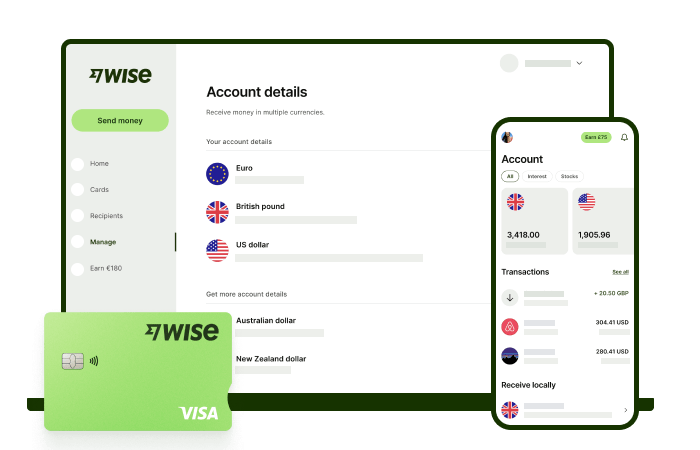Opening a bank account in Australia from Ireland: How does it work?
Discover how you can open a bank account in Australia from Ireland, including the documents and steps.

As a student taking a third level course, you’ll be able to find some great options out there to help you manage your money. Getting a student account makes sense.
Typically student accounts offer perks which aren’t available to all customers - these may be cashback rewards, lower transaction fees, or interest-free overdrafts. The features and fees vary between banks and account types and finding the right one for you can mean you save money on fees, and have more to spend on yourself.
In this guide, we’ll cover the account options available from Ulster Bank for students in the Republic of Ireland, including the costs you need to know about and how to get started.
Before you start reading, a word.
If you’re studying abroad full time, taking a year abroad to perfect your language skills, or planning on interning overseas during the summer, you need Wise.
Wise offers low cost international payments which use the mid-market exchange rate. That means no exchange rate markups, and no hidden costs - just a small transparent charge per transaction. This can work out far cheaper than using your regular bank.
Whether you need to pay your international tuition fees, put down a deposit on rental accommodation, or send money internationally to fund your day to day expenses abroad, you could save with Wise.
Now back to what you came here to read.
Ulster Bank offers a student account aimed at students in third level study courses which last between 1 and 6 years. You have to be 18 or over to apply. Once your course finishes you’ll be offered the opportunity to move to an Ulster Bank graduate account.¹
The Ulster Bank student account comes with a Visa debit card you can use for mobile payments, online and mobile banking options, and an interest-free student overdraft. This feature definitely sets this account apart from other options. There are still fees which apply to managing your account day to day, but if accessing an overdraft is what really matters to you, this may be a good choice.
Another neat feature is the Get Cash option which allows you to make small cash withdrawals even if you’ve forgotten your card². You can select the amount you want to withdraw within the mobile banking app, and get an SMS passcode which is valid for 3 hours and can be used to withdraw money at an ATM without your card. There’s a fee for this service, and it can only be used up to twice a day.
You can get a linked Visa debit card with your Ulster Bank student account.³ This allows for contactless payments, as well as mobile payments, cash withdrawals and chip & PIN transactions. It’s important to note that the fees for different payment types vary - using the contactless service is very cheap at only €0.01 per transaction, but paying using chip & PIN can be more expensive. Check out the full details before you get started.
You can register your Visa card for a cashback reward programme, to make the most of your spending - and also use your card as you travel. Again, fees vary when spending or withdrawing in non-euro currencies, so make sure you know what charges to expect before you travel.
There’s no maintenance fee with the Ulster Bank student account - you can also access interest-free overdraft facilities, subject to eligibility. However, there are some regular transaction fees which may apply to your account. Depending on your account balance and the exact terms you’re offered, you might be able to get a waiver on some of these fees - check the smallprint when you sign up.
Here’s what you need to know:
| Service | Ulster Bank student account fee |
|---|---|
| Contactless debit card and mobile payments in euros | €0.01/transaction |
| Automated payments like direct debits and standing orders | €0.20/transaction |
| Euro debit card and in app purchases | €0.20/transaction |
| Euro ATM withdrawal within SEPA | €0.35/transaction |
| In branch withdrawals and lodgements | €0.80/transaction |
| Foreign currency card payments, including mobile payments | 1% commission charge (minimum €0.25 to maximum €6) + 1% exchange rate transaction fee (minimum €0.25 to maximum €6) |
| Foreign currency ATM withdrawals | 2% commission charge (minimum €3 to maximum €12) + 1.5% exchange rate transaction fee You may be able to get commission free GBP withdrawals from selected ATMs in Northern Ireland and Great Britain |
| Sending money internationally within SEPA (Single Euro Payment Area)⁴ | There is no upfront transfer fee from Ulster Bank. However, if you’re sending a payment in a currency other than euros, you may find a charge in the form of an exchange rate markup. Fees may be applied by the overseas bank - more on that in a moment. |
| Sending money outside of SEPA⁴ | Sending in euros - €0.51 transfer fee If you’re sending in a currency other than euros there is no upfront transfer fee from Ulster Bank. However, you may find a charge in the form of an exchange rate markup. Fees may be applied by the overseas bank - more on that in a moment. |
| Receiving money from aborad⁵ | Payments received in euros - €2 Fees vary for other currencies. If you receive a payment in a foreign currency it will be converted to euros at the exchange rate chosen by Ulster Bank before being deposited in your account. This may mean there’s a markup -an extra fee - on the exchange rate used. |
You’ll notice in the fee table above that we mention additional fees applied by the overseas bank. This type of charge is applied when payments are made using the SWIFT network.
The SWIFT network involves a series of banks working together to move international payments. Several banks may be involved in a single transfer, and each can deduct a fee for the service they offer. These costs are deducted as the payment is processed, and can mean the recipient gets less than you might expect.
You can start the application process for your account online, or call into a branch. If you’re headed into a branch you’ll need to take along all the required documents - if you apply online you can then later present your documents in a branch, post in certified copies, or you may be able to upload information online. ⁶
Here’s an outline of what you’ll need:
Let’s also take a look at the documents which are acceptable for opening a student account. It’s worth noting that some documents can only be used when attending a meeting in branch to open your account. If you’re applying by phone or online, check the details to make sure you’re selecting acceptable paperwork.
Proof of ID
Proof of address
Proof of student status
Proof of PPSN
If you’re applying for your Ulster Bank student account by post, you’ll have to post in certified copies of your documents instead of the originals.
Documents can be certified by a member of Ulster Bank staff, a solicitor, accountant or notary public. You’ll need to show them the original document and have them certify a copy to confirm it is a valid document. The official certifying the document will then add their name and position to the copy, as well as the wording ‘original sighted’ to confirm they’ve checked the original document. Finally, the certifying official will sign, date and stamp the copy to complete the process.
You’ll be able to apply for an overdraft with your Ulster Bank student account - but whether or not you’re eligible, and the limit you’re set will depend on a couple of factors. If you find you’re eligible, the interest-free overdraft option is what makes this account stand out from the crowd - although you’ll still need to weigh up whether it’s worth paying some of the transaction fees which would be inevitable if you choose to go with the Ulster Bank student account.
Here are your options:⁷
Once you’ve submitted your application, Ulster Bank will assess your creditworthiness and decide on the credit amount to offer you. This may be less than the amount you applied for. You can also change your overdraft limit up or down - within the amount you’re offered - by applying to Ulster Bank.
Whatever limit you end up with on your overdraft, it’s important to note that it must be fully repaid within one year of finishing your study course.
If, during the course of your studies you find yourself in an unauthorised overdraft - meaning you’ve exceeded the agreed amount on your overdraft facility - you’ll probably have to pay extra fees. This may include a penalty interest and irregular or unpaid item charges.
When you finish your university course, Ulster Bank will offer you the opportunity to switch to a graduate account.⁸
Graduate accounts can be maintained for 12 months and come with a different set of features and fees compared to the student account. You’ll be able to access further lending facilities through Ulster Bank to get you started after uni - but don’t forget that this will lock you into repayments once the loan terms end. Make sure you fully understand the repayment schedule and conditions when you apply.
Here are some of the key things to know:
There are credit checks in place for overdraft and loan facilities, and loans can not be used for leisure travel. You’ll be able to keep your graduate account for 12 months and will then be switched to a regular current account product.
| Read more: How to close your Ulster Bank account in Ireland |
|---|

The Ulster Bank student account is a strong option if you want to get an overdraft and expect to mainly spend using your contactless card. But if you're planning on heading overseas, or if you spend online in foreign currencies, you may be better off with the Wise multi-currency account and linked debit card.
The Wise account lets you hold dozens of currencies in the same place, and switch between them online and using the app. You’ll always get the mid-market exchange rate with no markups and no surprises. There’s just a low transparent fee per transaction.
Planning on heading overseas? Top up your account in euros and then switch to the currency you need, when you need it. It’s always free to spend currencies you hold using your card, and you’ll be able to make up to 2 withdrawals to the value of €200 a month fee free, too. After that, there’s a low fee of 1.75% for ATM withdrawals, wherever in the world you happen to be.
Sources used:
All sources last checked on March 16 2021
*Please see terms of use and product availability for your region or visit Wise fees and pricing for the most up to date pricing and fee information.
This publication is provided for general information purposes and does not constitute legal, tax or other professional advice from Wise Payments Limited or its subsidiaries and its affiliates, and it is not intended as a substitute for obtaining advice from a financial advisor or any other professional.
We make no representations, warranties or guarantees, whether expressed or implied, that the content in the publication is accurate, complete or up to date.

Discover how you can open a bank account in Australia from Ireland, including the documents and steps.

What are the PayPal fees for consumers in Ireland? How much do you pay when sending money? Read here.

Read this guide on how to open a PayPal account in Ireland. Discover the documents, costs and more.

Discover how Revolut works in Ireland. Explore the mechanics of Revolut's operations tailored specifically for Irish customers.

All you need to know about opening a bank account in Ireland. See what documents, how long it takes and how it works.

Check how to close a Revolut account in Ireland and what to do before starting the process. Also, check an alternative for managing your money.